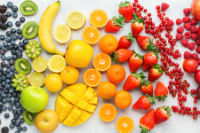
An interesting question that people commonly ask about food and nutrition: Is there that much difference between foods grown 30 years ago and foods grown today?
The answer is YES.
Decades ago, conventionally grown fruits and vegetables were much richer in vitamins and minerals than the varieties most of us are consuming in the 21stCentury. The root of the problem is soil depletion, a result of the invasive agricultural processes used on conventional farms. Over the past half century, there are reliable declines in the amount of protein, calcium, phosphorus, iron, vitamin C, and the B vitamins found in produce. But that’s not all that is being depleted in fruit and vegetable crops.
What else is being depleted? Phytonutrients.
Phytonutrients are special plant chemicals that give fruits and veggies their color and are essential to keeping a plant healthy. They protect the plant from invasive pests, exposure to UV radiation, and support growth and maintenance from roots to leaves. Not only are phytonutrients important for plants, they are extremely beneficial to human health.
Phytonutrients have antioxidant and anti-inflammatory properties that help maintain healthy cells in the body. They enhance immunity and intercellular communication, repair cellular damage, help build bones, and support the body’s innate detoxification processes. Additionally, phytonutrients play a role in the health of the major physiological systems. Consuming a diet rich in phytonutrients is regarded by researchers and health practitioners as an effective strategy for reducing risk for cancer, heart disease, and other chronic diseases.
Different types of fruits and vegetables can contain a variety of the more than 900 known phytonutrients. These include flavonoids, carotenoids, lignans, phytosterols, resveratrol, isoflavones, to name a few. Cooking time affects phytonutrient content. Where possible, eat raw produce or use minimal cooking times such as sauteing or steaming, or add veggies and fruits in the final few minutes of other cooking methods.
The bottom line given that phytonutrients are so important for health and that the levels are dropping in foods: eat more veggies and fruits! Work with your holistic health practitioner to create an individual plan for you and your family that takes into account nutritional needs, food sensitivities and your health plan.
